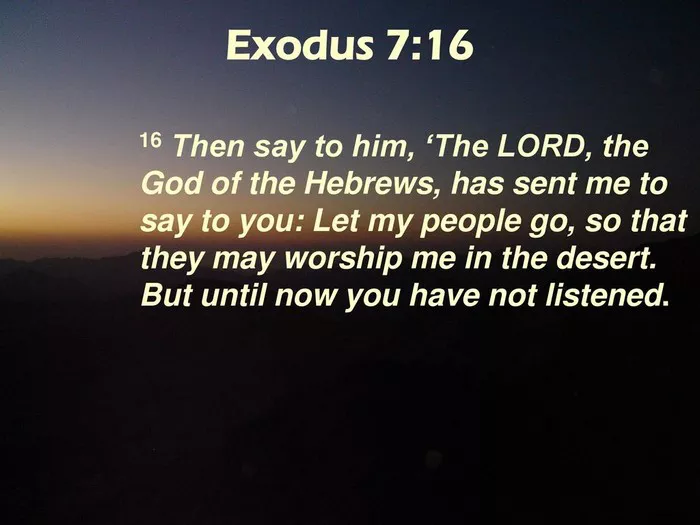Read the Daily Bible Verse – Exodus 7:16 To Strengthen Your Spiritual Journey.
Exodus 7:16 (KJV) states: “And thou shalt say unto him, The Lord God of the Hebrews hath sent me unto thee, saying, Let my people go, that they may serve me in the wilderness: and, behold, hitherto thou wouldest not hear.”
This verse captures God’s direct command to Pharaoh through Moses, emphasizing His authority, the demand for Israel’s freedom, and Pharaoh’s resistance. It serves as a cornerstone for understanding God’s purpose in the Exodus narrative and offers profound lessons for modern readers.
The Context on Exodus 7:16 KJV
Understanding the significance of Exodus 7:16 requires examining its immediate and broader context within the narrative of the Israelites’ liberation.
The Immediate Context
Exodus 7 unfolds as God commands Moses and Aaron to confront Pharaoh and demand the release of the Israelites. This chapter marks the beginning of the confrontation between God and Pharaoh, represented by the ten plagues. Before this verse, Moses has already been instructed to meet Pharaoh at the Nile and deliver God’s message (Exodus 7:15). Verse 16 conveys the essence of that message, highlighting Pharaoh’s refusal to obey God’s commands.
The Broader Context
The demand “Let my people go, that they may serve me” is a recurring theme in the Exodus story (Exodus 5:1, 8:1, 9:1). It reflects God’s covenant relationship with Israel and His intention to free them from slavery so they can worship Him freely. Pharaoh’s repeated resistance illustrates human rebellion against divine authority, setting the stage for God’s demonstration of power and justice.
The Exodus 7:16 Meaning
Exodus 7:16 is a multifaceted verse rich with theological and practical meaning. It conveys themes of divine authority, purpose, and human resistance.
God’s Sovereign Authority
The declaration “The Lord God of the Hebrews hath sent me unto thee” establishes that Moses speaks on behalf of the Creator. God identifies Himself as the covenant-keeping deity of the Hebrews, affirming His relationship with His chosen people and His right to command Pharaoh.
A Call to Freedom
The demand for the Israelites to be released is not merely about physical liberation but also about spiritual purpose. God’s intent is clear: the people are to serve Him in the wilderness, signifying worship, devotion, and covenant renewal.
Pharaoh’s Resistance
The phrase “hitherto thou wouldest not hear” underscores Pharaoh’s hardened heart. His refusal to listen highlights the spiritual battle between God’s will and human pride, a theme that resonates throughout the Bible.
Exodus 7:16 Application in Life
This verse offers timeless lessons for believers about obedience, worship, and confronting opposition with faith.
Obedience to God’s Call
Just as Moses faithfully delivered God’s message to Pharaoh, believers are called to obey God’s commands, even when faced with opposition. This requires courage, trust, and reliance on God’s strength.
Worship as a Central Purpose
The call to serve God in the wilderness reminds Christians that true freedom is found in worship and devotion to God. Liberation from sin and bondage is not an end in itself but a means to glorify God.
Perseverance Amid Resistance
Pharaoh’s refusal to listen mirrors the challenges believers face when sharing God’s truth. This verse encourages perseverance, trusting that God’s purposes will ultimately prevail.
Comparison with Other Biblical Texts
Exodus 7:16 aligns with various Scriptures that emphasize God’s authority, the call to worship, and human resistance to divine commands.
Isaiah 43:1
“Fear not: for I have redeemed thee, I have called thee by thy name; thou art mine.”
This verse echoes the theme of God’s ownership and protection of His people, as seen in His demand for Israel’s release.
John 4:23-24
Jesus speaks of worshiping God “in spirit and in truth,” reflecting the ultimate purpose of the Israelites’ liberation—to serve and worship God wholeheartedly.
Romans 9:17-18
Paul references Pharaoh’s hardened heart to illustrate God’s sovereignty in displaying His power and glory through human resistance.
Modern-Day Relevance
Exodus 7:16 remains deeply relevant, offering insights into faith, purpose, and God’s work in the world today.
Calling People to Worship
Believers are called to share the gospel, inviting others to experience the freedom and purpose found in worshiping God. This mirrors Moses’s mission to call the Israelites out of bondage.
Confronting Modern Pharaohs
Pharaoh represents any power or system that opposes God’s will. In today’s world, Christians are often called to challenge injustice, false ideologies, and spiritual bondage, trusting in God’s guidance.
Trusting in God’s Sovereignty
Pharaoh’s resistance and eventual defeat remind believers that no human power can thwart God’s plans. This assurance encourages faith and perseverance in the face of challenges.
Exodus 7:16 Commentary
Biblical commentators provide valuable insights into the theological and practical dimensions of Exodus 7:16.
Divine Purpose and Human Freedom
Many scholars emphasize that God’s demand for Israel’s freedom is tied to His covenantal purpose. The liberation from Egypt is not merely physical but spiritual, aimed at restoring worship and relationship.
The Hardening of Pharaoh’s Heart
Pharaoh’s resistance is often viewed as a demonstration of human pride and the consequences of rejecting God’s authority. It serves as a warning against hardening one’s heart to God’s call.
God’s Demonstration of Power
The repeated confrontations between Moses and Pharaoh highlight God’s patience and justice. Each plague serves to reveal God’s supremacy over Egypt’s gods and Pharaoh’s false claims of divinity.
Conclusion
Exodus 7:16 is a pivotal verse that encapsulates God’s authority, His call to worship, and the resistance of human pride. It challenges believers to obey God’s commands, prioritize worship, and persevere in faith despite opposition.
The verse serves as a reminder that God’s purposes cannot be thwarted and that true freedom is found in serving and worshiping Him. As we navigate modern challenges, Exodus 7:16 inspires us to trust in God’s sovereignty, proclaim His truth, and live in obedience to His will.
Related Topics:
- What Does Exodus 7:15 Mean?
- Exodus 7:14 Meaning, Context & Commentary
- What Does Exodus 7:13 Mean?

